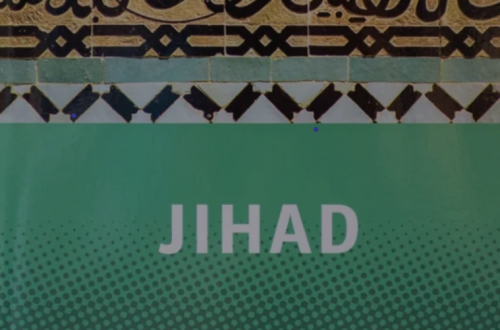“Sharia is knocking on the door of Britain,” says Sheikh Suhaib Hassan, General Secretary of the UK Islamic Sharia Council, a group which issues Islamic fatwas and lobbies government to have aspects of Sharia law – initially Muslim family law – incorporated into British law.
Sheikh Suhaib Hassan, also a member of the European Council for Fatwa and Research (presided over by our old friend, Qaradawi), of course, was featured in another Dispatches programme heralding the eventual Islamification of Britain and declaring jihad against non-Muslims in a sermon at Green Lane Mosque, views branded as “extreme”. In this programme we see him watching the programme and shrugging off these accusations. He says his views (which he does not deny) may be extreme to some, but that this is just a point-of-view.
It seems that the Sharia Council is ill-equipped to deal with women’s issues, and certainly the cases shown on the programme demonstrate that the women come off second best.
One woman, Irum Shazad, is filmed in a taxi on her way to see the Sheik, who she hopes will grant her an Islamic divorce from her abusive husband. “I feel really relaxed about seeing Dr Hassan, schollar. I’m already in awe because, you know, he’s here to help me. He’s one of the few Asian men who doesn’t have that cultural perspective ‘here comes another Pakistani girl wanting a divorce – how dare she!'” She was to be disappointed.
Basically, what went down was that the Sheik asked Irum to consider forgiving her husband (who had expressed contrition to the Sheik). She said that she’d done that so many times but even after she’d been driven to a suicide attempt, her husband was unmoved. Hussan then berated her for having committed the bigger sin and asked how she could expect forgiveness if she wouldn’t consider forgiving her husband.
Irum left the meeting in tears. “Well… it’s not what I expected. I expected a little more compassion.”
Another couple featured on the programme were Imran and Nasira. It seems Imran met someone he fancied more than his wife, so married her in Pakistan, while remaining married to his wife in England. He now has two wives, but the first isn’t happy. Much to her relief, he divorced her, but later regretted it, so spoke to the Sharia Council about declaring the divorce null – which they did. The marriage (to both wives) being declared valid by the Sharia Council, the families forced the unhappy woman back together with her ‘husband’. She tells the reporter: “He knows I didn’t want to come back. My family forced me to. He’s got both his wife and children back. What did I get out of it? I’m not happy about it!”
Later it ends in tears too, and in a dramatic fight in front of the children. Imran goes off to be with is wife in Pakistan for a while, while Nasira remains married, unhappily, to him here, while the parents seem content that their ‘honour’ is intact.
Nevertheless, Lord Ahmed saw fit to introduce Sheik Hassan to the Lord Chancellor to discuss the proposed incorporation of Sharia family law into British law. Nothing has come of it so far. Let’s hope nothing ever does. British citizens should be equal under the law. One law for everyone is fundamental.
Last month, a Telegraph story on the Islamic Councils noted:
“To many in the West, talk of sharia law conjures up images of the floggings, stonings, amputations and beheadings carried out in hardline Islamic states such as Saudi Arabia and Iran. However, the form practised in Britain is more mundane, focusing mainly on marriage, divorce and financial disputes.”
This may be true, but Sheik Hassan admits a preference for taking it further, fueling fears and legitimising warnings by some Women’s rights groups that this is just a thin edge of the wedge. In the Dispatches programme, Hassan says:
“We admit that we are not contributing anything for the advancement of science, but we have brought something good with us, and that is our way of life, our giant family system where there is respect for elders… and we know if Sharia Law is implemented we can turn this country into a haven of peace, because if a thief’s hand is cut off, nobody steals…”
But here’s the most shocking bit – wait for it:
“”If once – just once – an adulterer is stoned, no one would commit this crime.”
Eh? What?
Religious family law is at best paternalistic and at worst a codified, ritualistic cover for women-abuse. It has no place in civil law.
At least the Sheik’s views are consistent. Previously, Sheik Hassan has stated:
“Even though cutting off the hands and feet, or flogging the drunkard and fornicator, seem to be very abhorrent, once they are implemented, they become a deterrent for the whole society. This is why in Saudi Arabia, for example, where these measures are implemented, the crime rate is very, very, low”
Nevertheless, Sheik Hassan is optimistic. He says:
“One day I think the British Government will consider that [Sharia Law] is something that will make their burden lighter – and then this is going to win their hearts.”
Let the hearts and out-of-their-minds campaign begin here.
Meanwhile… The Associated Press is reporting that “British men who marry several women in a country where polygamy is allowed can legally claim welfare benefits for all of them, a government review has concluded.”

